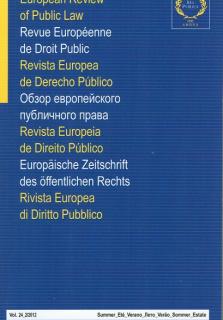
Administrative Law / Droit administratif
THE NETHERLANDS / PAYS-BAS
ARIE JANSSE BOK
Senior lecturer in administrative law at the Radboud University Nijmegen, The Netherlands
In 2010, in the Netherlands the bill 32 450 has been submitted to Parliament, in order to achieve a number of ameliorations and simplifications of administrative litigation. Amongst others, the bill introduces the requirement that an appellant before the administrative courts must be affected in a legally protected interest ('doctrine of relativity'). The bill also deals with another major issue in Dutch administrative litigation: the strive for a more final settlement of disputes. Extended powers of the courts in this respect - such as providing themselves in the case, or sending back the case to the administration with the order to take a modified decision ('administrative loop') - find their limits, however, in the fundamental rule that the administrative courts may not interfere too largely into the discretionary powers of the administration. In order to promote the coherence of administrative case law, Grand Chambers and the possibility of advisory conclusions at the supreme administrative courts are being introduced. The bill, however, does not provide for the problem that in the Netherlands various supreme administrative courts remain to exist, with the risk of diverging decisions of these courts.
En 2010, aux Pays-Bas un projet de loi (no 32 450) a été soumis au Parlement afin de mener à bien un certain nombre d'améliorations et de simplifications dans les litiges administratifs. Entre autres, le projet de loi introduit l'exigence que l'appelant devant les cours administratives ait été lésé dans un intérêt protégé par la loi ("doctrine de la relativité"). Le projet de loi touche aussi à un autre point majeur du litige administratif aux Pays-Bas: la recherche de règlement plus définitif des conflits. Les pouvoirs étendus des tribunaux à cet égard - tels que décider eux-mêmes dans l'affaire ou renvoyer l'affaire à l'Administration avec l'ordre de prendre une décision modifiée ("boucle administrative") - ont toutefois trouvé leurs limites dans la règle fondamentale selon laquelle les juridictions administratives ne peuvent interférer trop largement dans les pouvoirs discrétionnaires de l'Administration. Afin de favoriser la cohérence de la jurisprudence administrative, des Grandes Chambres et la possibilité de conclusions consultatives aux cours suprêmes administratives ont été introduites. Cependant, le projet de loi ne règle pas le problème qu'aux Pays-Bas, il existe encore plusieurs cours suprêmes administratives, avec le risque de décisions divergentes.





















